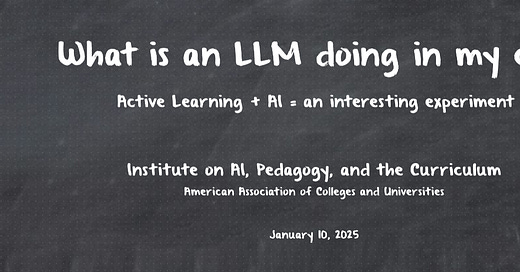𝐀𝐈 𝐋𝐨𝐠 teaches
I wonder that a robot has not been invented to make the assignments, give the objective tests, mark the scores and—chloroform all teacher who dared bring original thought to the specific problems and needs of their pupils.
—Anna Julia Cooper, The Humor of Teaching (1930)
Welcome to AI Log teaches
Educational institutions would be better places if the management cliche “hire good people and get out of their way” were applied to teachers. I write about my classroom practices out of hope that more teachers will have the freedom to teach what students need, not what the district requires, the school board says, or the state mandates.
What is an LLM doing in my classroom?
This series of essays is about using an LLM tool in my history class during the fall term of 2024. It is based on a talk I first gave in January as part of the Institute on AI, Pedagogy, and the Curriculum. I am grateful to the AAC&U for the invitation and to the audience for the energetic conversation.
Part 4: Next*
*Coming soon to AI Log.
What I try to do in the classroom
January 15, 2025
Reading and writing are fundamental to what I do in the classroom. So is the idea that learning is an active process that involves students making knowledge by taking action on the world rather than passively consuming content provided by their teachers and regurgitating it for a grade. People who like acronyms call this structured active in-class learning (SAIL).
My approach to the classroom was shaped by a two-year stint teaching in the Rutgers Writing Program during the early 2000s, which, at the time, was led by Kurt Spellmeyer and Richard E. Miller. During that period, I read a lot of Ralph Waldo Emerson and Richard Poirer, attended classes in the history and English departments at Rutgers University, taught lecture courses and senior seminars in American Studies, and devoured every issue of Raritan Quarterly.
To the extent that I have a philosophy of teaching, it is grounded in what the women teachers at the Chicago Laboratory School taught John Dewey in the 1890s and that he wrote about in highly regarded books about schooling in a democratic society. Dewey’s less-known contemporary, Anna Julia Cooper, is also important to the educational ideas that inform my teaching. In 1930, the editor of The Crisis, W. E. B. Du Bois published her essay “The Humor to Teaching.” Despite the title, it only has one joke, a darkly funny one that appears at the top of this page.
“The Humor to Teaching” is available in the collection The Voice of Anna Julia Cooper, Including a Voice from the South and Other Important Essays, Papers, and Letters. Here is a cool digitization of the original manuscript she sent to W. E. B. Du Bois, the editor of The Crisis, along with this note.




